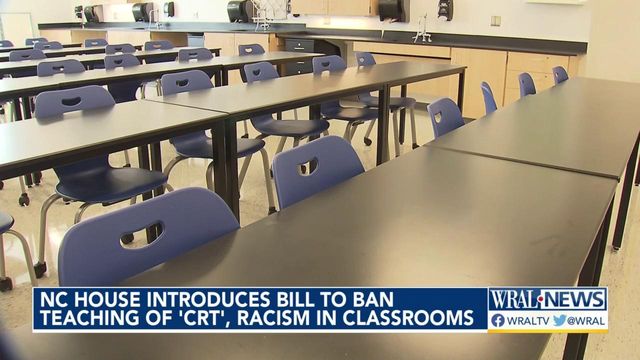Should NC schools ban critical race theory? NC lawmaker's bill would do just that
A new bill in the state House would ban schools from teaching that not everyone is born equal in America.
Posted — UpdatedA new bill in the North Carolina House of Representatives would ban schools from promoting racism in the classroom, and would also ban them from teaching that systemic racism exists.
The study of systemic racism is often referred to as “critical race theory,” or CRT.
The new bill would ban schools from teaching, for example, that not everyone is born equal in America. It would also prohibit any lessons or readings that might suggest “the rule of law does not exist, but instead is a series of power relationships and struggles among racial or other groups.”
Tamika Walker Kelly, president of the North Carolina Association of Educators, says the bill would limit an honest conversation about history.
"There has been a chilling effect on how we teach history in our classrooms, what subjects we engage in and how we approach talking to our students who bring us questions and challenge us around what we are teaching in curriculums. so we need to foster classrooms that teach creative conversations, difficult conversations," she said.
Critical race theory is mostly limited to studies in graduate school and some law schools, but in recent years there has been a nationwide push by Republican politicians to claim it’s widespread in public grade schools, too.
Thursday’s bill was filed by Rep. John Torbett, a Gaston County Republican who is chairman of the K-12 education committee in the state House.
A similar bill passed the legislature in its 2021 session, despite emotional objections from many of the state’s Black lawmakers. They said the bill was intended to scare teachers into hiding America’s lengthy history of racism from students.
Democratic Gov. Roy Cooper vetoed it when it passed last session, writing that “this bill pushes calculated, conspiracy-laden politics into public education.”
Republicans, however, said at the time that it was necessary to prevent schools from teaching white children to feel guilty because of their race. Torbett, who also sponsored the previous version of the bill, said during the 2021 debate that he felt no child "should ever be made to feel inferior solely because of their skin or their gender."
Torbett didn’t immediately respond to a request for comment.
Under the bill, schools would still be allowed to have “impartial instruction on the historical oppression of a particular group of people based on race, ethnicity, class, nationality, religion, or geographic region,” or other controversial topics.
It would apply to teachers as well as any outside speakers that schools might bring in.
In addition, schools would also be required to report to the state if they brought in an outside speaker who had ever, at any point in the past, spoken about any of the topics that the bill would now ban.
• Credits
Copyright 2024 by Capitol Broadcasting Company. All rights reserved. This material may not be published, broadcast, rewritten or redistributed.






